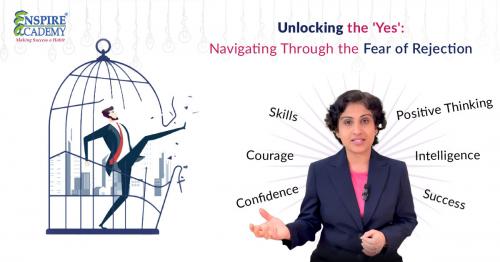Unlocking the Power of "Yes": Overcoming the Fear of Rejection

The Fear of Rejection: A Universal Emotion
At some point in our lives, we've all encountered that heart-pounding, gut-wrenching sensation that cripples our thoughts and actions: the fear of rejection. In today's fast-paced digital world, this fear appears to be increasingly prevalent. But why does the fear of rejection wield such immense power over us? To grasp its significance, let's delve deeper into its roots.
Why Do We Fear Rejection?
Rejection stings because it's deeply embedded in our evolutionary history. In ancient times, being rejected by one's tribe could spell death, as the tribe was crucial for protection, resources, and reproduction. Consequently, humans have evolved to be highly attuned to social dynamics, with rejection posing a genuine threat to our sense of belonging.
Moreover, our modern society places great emphasis on success, often causing us to link our self-worth with acceptance and perceive rejection as a mark of failure. The digital age amplifies this by introducing social media platforms where the number of likes or followers can seem like a direct measure of our worth in the eyes of our peers.
Indeed, fear of rejection is a natural human emotion, but it also stands as a formidable obstacle to personal and professional growth.
Recognizing the Fear of Rejection
Do You Have a Fear of Rejection?
The fear of rejection, often referred to as "rejection sensitivity," can manifest in various ways. Individuals grappling with this fear might go to great lengths to avoid situations where rejection is possible, even if it means forgoing opportunities for personal growth. It's crucial to understand that the signs and symptoms can vary among individuals. Here are five common indicators:
1. Avoidance Behavior: This may involve shunning social events, isolating oneself, refraining from applying for a job, or withholding opinions to evade potential rejection.
2. Overthinking: Constantly dwelling on past interactions and scrutinizing them for signs of rejection, or incessantly worrying about future interactions. Sometimes, neutral or ambiguous actions or statements from others are misinterpreted as rejection.
3. Overly Pleasing Behavior: Going to great lengths to please others, even at the expense of one's own desires, merely to gain acceptance.
4. Difficulty Making Decisions: The fear of making the "wrong" choice due to apprehension about potential negative feedback or rejection.
5. Low Self-Esteem: A pervasive feeling of inadequacy or unworthiness, which can lead to a self-fulfilling prophecy of expecting rejection. Some individuals may require constant affirmation from others regarding their worth, value, or likability.
Overcoming the Fear of Rejection: Four Actionable Strategies
Reframe Rejection:
1. Reframe Rejection as Feedback
Begin viewing rejection as feedback, not as a failure. Consider the example of J.K. Rowling, who faced multiple rejections from publishers for "Harry Potter." She didn't interpret it as a personal failure but as an indication to explore a different path. Transforming negative experiences into learning opportunities can boost your intrinsic self-worth, reduce anxiety, and make you more resilient in the face of rejection.
Real-life examples:
Public Speaking: Use rejection as an opportunity to enhance your skills. For instance, if you receive criticism for not engaging the audience, use it as motivation to improve your speaking style.
- Job Interviews: Instead of seeing a job rejection as failure, view it as a chance to gather feedback, refine your interview skills, or find a role that suits you better.
- School Tests: Treat lower-than-expected grades as feedback. Use this information to adjust your study techniques or focus on different areas.
2. It’s Often Not About You
When encountering rejection, remember that people have their own fears, insecurities, and challenges. It's not always a reflection of your worth. Oprah Winfrey, for instance, was once considered 'unfit for television' early in her career, yet she went on to have an undeniable impact in the industry. Sometimes, rejection is less about you and more about the circumstances of others.
Real-life examples:
- Public Speaking: If someone finds your presentation "boring," consider that they might be dealing with personal issues or fatigue. Focus on broader feedback rather than fixating on a single opinion.
- Job Interviews: Sometimes, job rejections result from factors beyond your control, such as specific experience requirements or internal candidates.
- School Tests: Lower grades may occasionally stem from misunderstandings or circumstances rather than your abilities.
3. Build Resilience
The more you confront rejection, the less power it wields over you. Take the example of Thomas Edison, who faced thousands of "rejections" before inventing the light bulb. He famously said, "I haven’t failed, I've just found 10,000 ways that won't work." Confronting rejection head-on can reduce its psychological impact over time and enhance your resilience.
Real-life examples:
- Public Speaking: Every speech, whether successful or not, contributes to your growth as a speaker. Embrace the learning experience.
- Job Interviews: Apply to multiple positions and attend numerous interviews to refine your interviewing skills. Each "no" brings you closer to the right "yes."
- School Tests: The more tests you take, the better you become at handling them. Each test, regardless of the outcome, prepares you for future academic challenges.
4. Seek Support and Mentorship
Surround yourself with positive individuals who uplift you. Share your fears and concerns; you'll be surprised how many can relate and offer valuable advice. Serena and Venus Williams attribute their success to familial support. Similarly, mentorship can provide guidance and validation that bolsters your confidence, whether you're a student, entrepreneur, or professional.
Real-life examples:
- Public Speaking: Join environments that foster growth in public speaking. Seek advice and feedback from experienced individuals, and learn from the mistakes of others.
- Job Interviews: Connect with career counselors, mentors, or colleagues for guidance and practice through mock interviews. Utilize networking platforms like LinkedIn for valuable connections and advice.
- School Tests: Join study groups or enlist the help of tutors in challenging subjects. Different perspectives can make complex topics more accessible.
In Conclusion
Rejection, though painful, is an integral part of the human experience. By reframing it, embracing exposure, and seeking support, you can lessen its sting and, more importantly, evolve through it. Now is the time to free yourself from the shackles of fear, whether it's fear of rejection, failure, loneliness, or relationship anxiety. Empower yourself to confront your fears with courage and self-confidence. When you do, fear will no longer be your adversary—it will be your stepping stone to success.
Keywords List:
1. Fear of Rejection
2. Rejection Sensitivity
3. Overcoming Fear
4. Reframing Rejection
5. Resilience Building
6. Seeking Support
7. Mentorship
8. Self-Confidence
9. Personal Growth
10. Rejection Trauma
11. Success and Failure
12. Self-Worth
13. Evolutionary Psychology
14. Digital Age
15. Social Media
16. J.K. Rowling
17. Oprah Winfrey






Comments